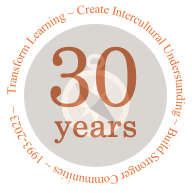Local Learning’s Work is Guided by an Iterative Plan. Rather than a map where X marks the destination and step-by-step directions spell out how to get there, Local Learning’s 2023-2028 strategic plan aims to act as a compass, guiding the organization toward its vision in a way that allows for continued responsiveness to the unexpected challenges and opportunities the coming years will no doubt include.
Read our 2023-2028 Strategic Plan
Mission (why we exist)
Local Learning connects folklorists, artists, and educators across the nation and advocates for transformative learning through the inclusion of folklife and traditional arts in education for the purpose of creating intercultural understanding and building stronger communities.
Values (how we serve)
Local Learning is people-centered and process-driven.
- To be people-centered means that respect, connections, partnership, equity, and inclusion inform all our relationships and collaborations.
- To be process-driven means that we work iteratively, with purposeful reciprocity and reflexivity built into our programs.
Vision (where we are headed)
Local Learning envisions a nation of lifelong learners who understand traditional arts and knowledge as critical tools for transformative solutions to the complex challenges of today’s world.
To build a more equitable and inclusive world, learners of all ages must purposefully develop the skills embedded in folklife methods to explore local knowledge, thereby recognizing one another’s humanity while learning more about themselves and their communities.
Our Story
Local Learning began as the National Task Force for Folk Arts in Education during a 1993 folk arts roundtable at the National Endowment for the Arts. Today, the core activities and programs of Local Learning provide services to the field of Folk Arts in Education and support practitioners. We convene with the national arts service organizations of other disciplines to ensure a folk arts presence in national conversations and participate in the crafting of national policy and advocacy initiatives. We offer technical assistance, circulate news of the field through a variety of media and platforms, and provide professional development for educators, folk artists, and folklorists. Building on our work as a digital pioneer in folk arts with the founding of the CARTS (Cultural Arts Resources for Teachers and Students) newsletter and website in 1998, our peer-reviewed, open access publication, the Journal of Folklore and Education (JFE), publishes work representing ethnographic approaches that tap the knowledge and life experience of students, their families, community members, and educators in K-16, higher education, museum, and community education. As a digital publication, JFE provides a forum for interdisciplinary, multimedia approaches to community-based teaching, learning, and cultural stewardship. Our audience includes educators and students at all levels and in all settings, as well as cultural specialists in a variety of settings.
In the fall of 2009, Local Learning received funding from the National Endowment for the Arts to convene associates in Boise, Idaho, to assess the organization’s achievements and to develop a set of goals and objectives for meeting current challenges and moving effectively into the future. The review identified the following characteristics of folk arts in education (FAIE) that we should build upon in the future.
Strengths and Hallmarks of Folk Arts in Education Projects
- FAIE curricula are interdisciplinary and standards-based and meet state and locally established goals for educational achievement. (FYI: Learn more about how folk arts and folklore may connect to education standards here.)
- FAIE programs are highly effective in bringing together multiple points of view and dealing with cultural and social complexities.
- Excitement among all parties in FAIE endeavors energizes the learning process and deeply engages participants.
- Folk arts and FAIE programs are both learner-centered and community-centered. They tap students’ knowledge and life experience as well as that of community members and teachers.
- The empathetic spirit and multiple points of view intrinsic in folk arts studies draw in all students comfortably.
- As students develop ethnographic skills, they also gain a sense of cultural stewardship and methods for achieving cultural sustainability.
- Inherently collaborative, FAIE programs stimulate creativity not only in students but also in teachers and other practitioners.
- Projects and research about their own traditions lead students through a process of self-discovery and help them to develop a greater sense of personal identity.
- The emphasis in folk arts upon authenticity, ethical interaction, and scholarly integrity elevates appreciation and respect for others’ cultures and for the study of culture.
- Folk arts study facilitates holistic learning systems and 21st-century skills by integrating literacy, mathematics, technology, the arts, social studies, science, and other disciplines.
- The study of folk arts helps students understand the important relationship of tradition and innovation in societal change as well as in their own lives.
- Both the practice of a folk art and participation in innovative methods of learning about them stimulate imagination and build problem-solving skills.
- Folk arts projects employ multiple intelligences and learning styles, making them very useful for a wide variety of learning situations.
- The field of folk arts and folklife study has developed replicable FAIE models and best practices all around the country.
The group recognized a need for more tools and methods for evaluating, elucidating, developing, and articulating the value and importance of folk arts and folk arts in education for academic learning and teaching and for building a stronger, more cohesive society.
The associates of Local Learning recognize that the achievement of this plan requires the participation of many advocates for and practitioners of folk arts education. We invite you to join with us in the effort. Send us your ideas and questions. Share your work with us and the Journal of Folklore and Education. Ask us how you can advance Local Learning initiatives in your region. Our collective efforts can further the incorporation of Local Learning at all levels around the nation.

